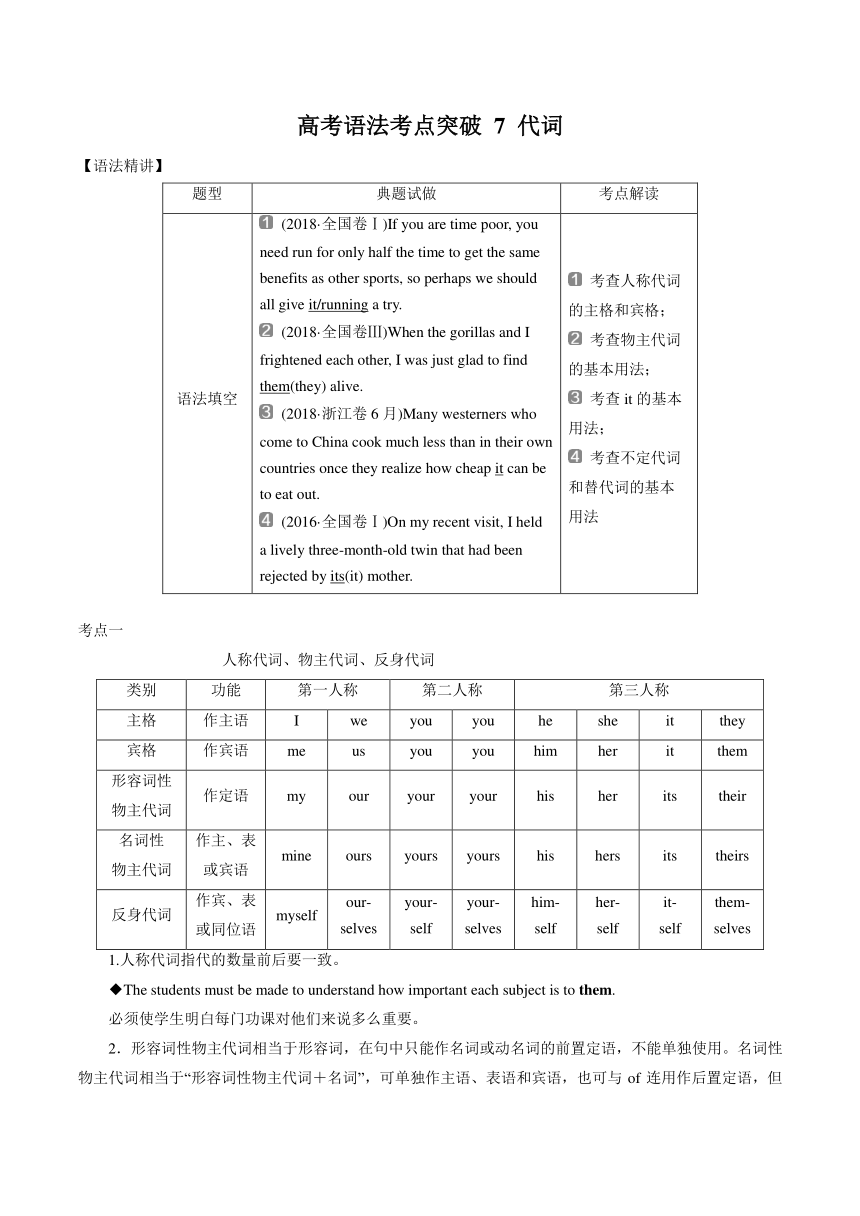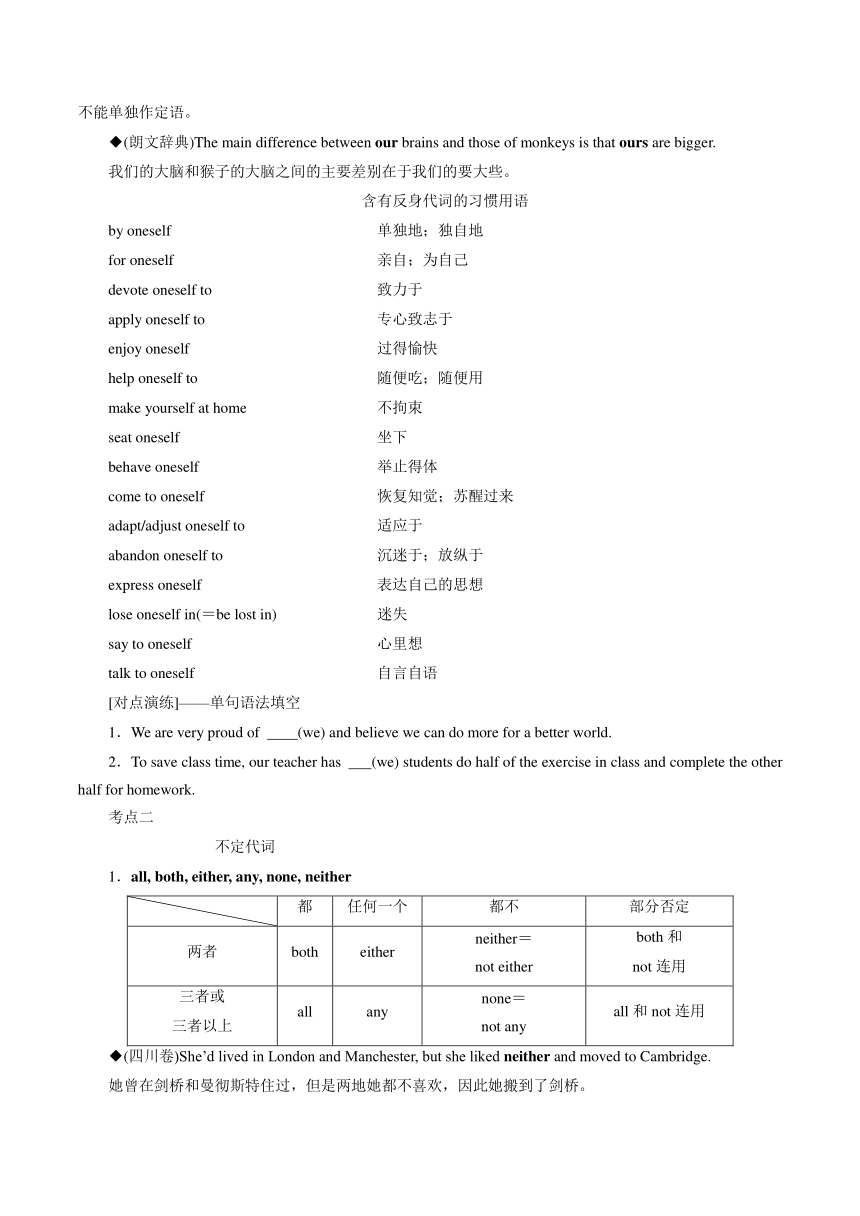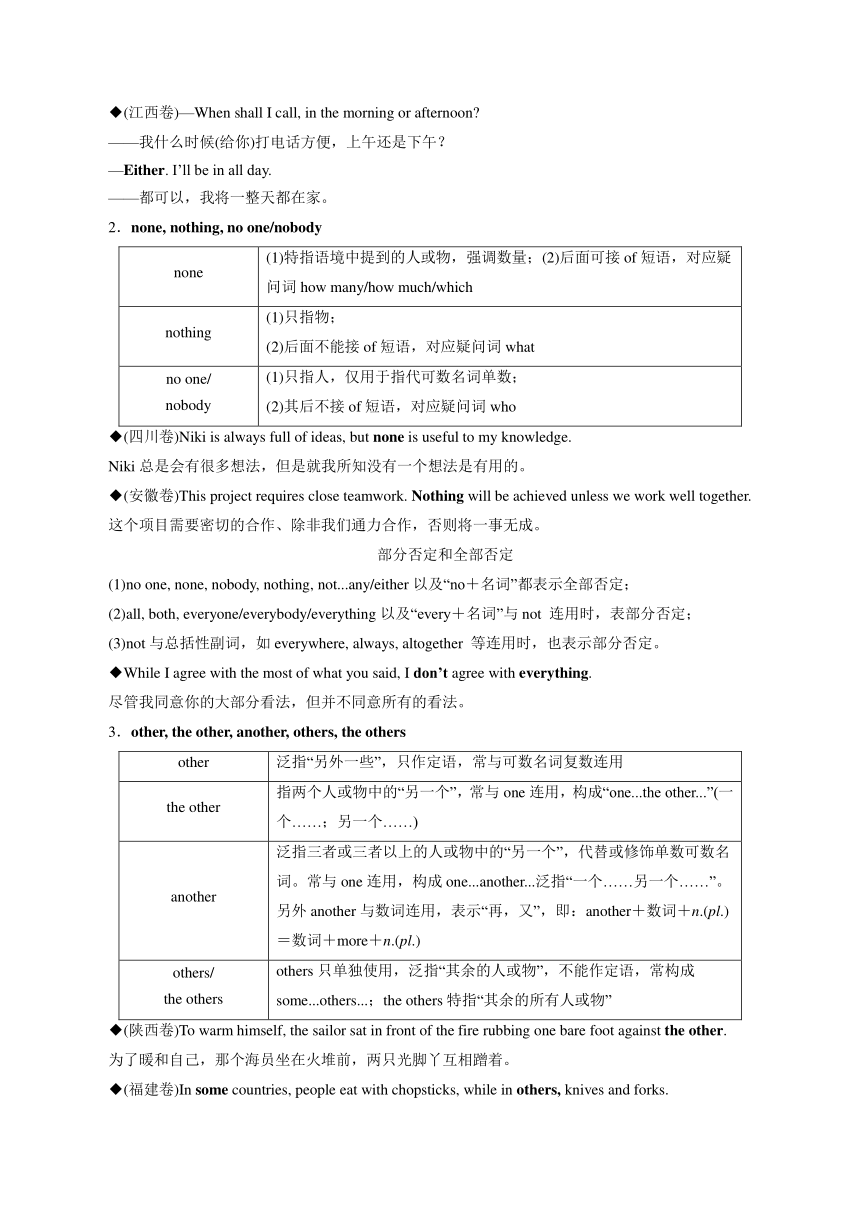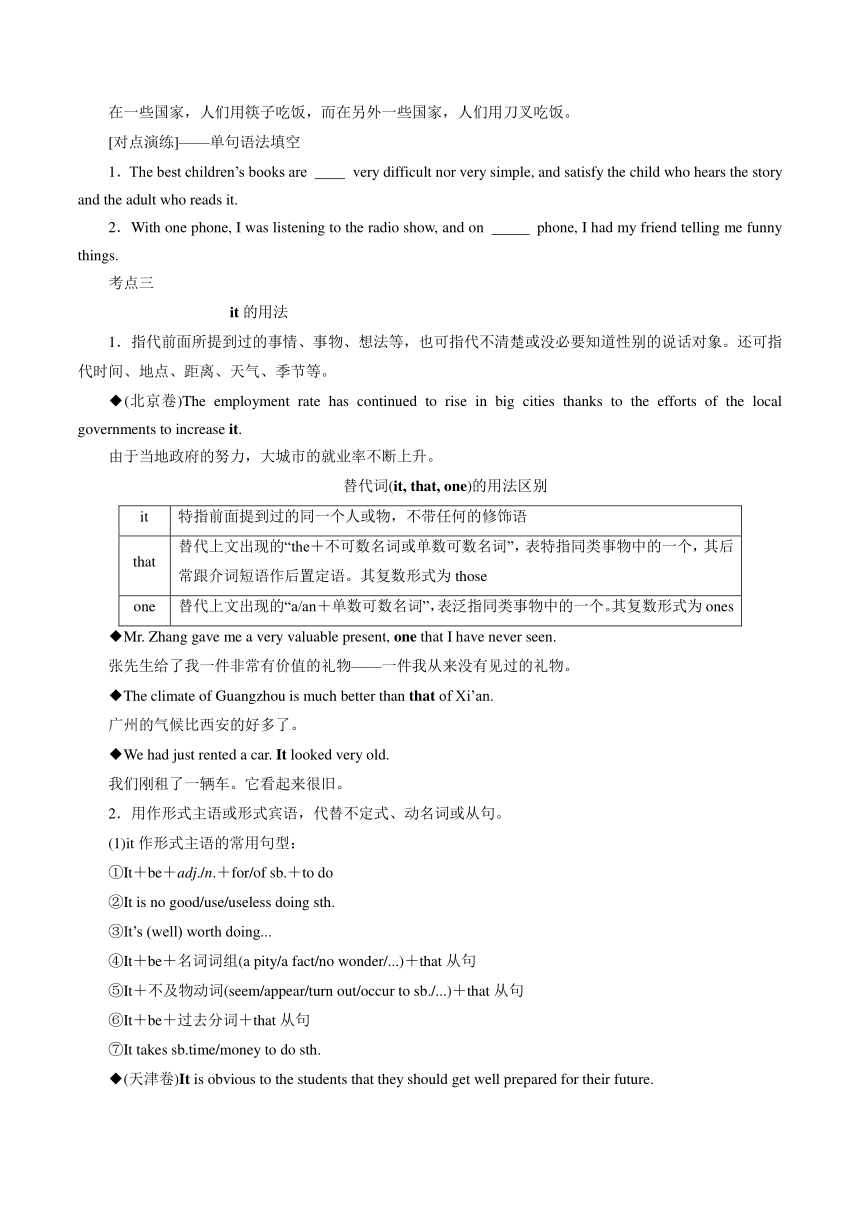高考语法考点突破7:代词(含解析)
图片预览




文档简介
高考语法考点突破
7
代词
【语法精讲】
题型
典题试做
考点解读
语法填空
(2018·全国卷Ⅰ)If
you
are
time
poor,
you
need
run
for
only
half
the
time
to
get
the
same
benefits
as
other
sports,
so
perhaps
we
should
all
give
it/running
a
try.
(2018·全国卷Ⅲ)When
the
gorillas
and
I
frightened
each
other,
I
was
just
glad
to
find
them(they)
alive.
(2018·浙江卷6月)Many
westerners
who
come
to
China
cook
much
less
than
in
their
own
countries
once
they
realize
how
cheap
it
can
be
to
eat
out.
(2016·全国卷Ⅰ)On
my
recent
visit,
I
held
a
lively
three?month?old
twin
that
had
been
rejected
by
its(it)
mother.
考查人称代词的主格和宾格;
考查物主代词的基本用法;
考查it的基本用法;
考查不定代词和替代词的基本用法
考点一
人称代词、物主代词、反身代词
类别
功能
第一人称
第二人称
第三人称
主格
作主语
I
we
you
you
he
she
it
they
宾格
作宾语
me
us
you
you
him
her
it
them
形容词性
物主代词
作定语
my
our
your
your
his
her
its
their
名词性
物主代词
作主、表
或宾语
mine
ours
yours
yours
his
hers
its
theirs
反身代词
作宾、表
或同位语
myself
our?
selves
your?
self
your?
selves
him?
self
her?
self
it?
self
them?
selves
1.人称代词指代的数量前后要一致。
◆The
students
must
be
made
to
understand
how
important
each
subject
is
to
them.
必须使学生明白每门功课对他们来说多么重要。
2.形容词性物主代词相当于形容词,在句中只能作名词或动名词的前置定语,不能单独使用。名词性物主代词相当于“形容词性物主代词+名词”,可单独作主语、表语和宾语,也可与of连用作后置定语,但不能单独作定语。
◆(朗文辞典)The
main
difference
between
our
brains
and
those
of
monkeys
is
that
ours
are
bigger.
我们的大脑和猴子的大脑之间的主要差别在于我们的要大些。
含有反身代词的习惯用语
by
oneself
单独地;独自地
for
oneself
亲自;为自己
devote
oneself
to
致力于
apply
oneself
to
专心致志于
enjoy
oneself
过得愉快
help
oneself
to
随便吃;随便用
make
yourself
at
home
不拘束
seat
oneself
坐下
behave
oneself
举止得体
come
to
oneself
恢复知觉;苏醒过来
adapt/adjust
oneself
to
适应于
abandon
oneself
to
沉迷于;放纵于
express
oneself
表达自己的思想
lose
oneself
in(=be
lost
in)
迷失
say
to
oneself
心里想
talk
to
oneself
自言自语
[对点演练]——单句语法填空
1.We
are
very
proud
of
(we)
and
believe
we
can
do
more
for
a
better
world.
2.To
save
class
time,
our
teacher
has
(we)
students
do
half
of
the
exercise
in
class
and
complete
the
other
half
for
homework.
考点二
不定代词
1.all,
both,
either,
any,
none,
neither
都
任何一个
都不
部分否定
两者
both
either
neither=
not
either
both和
not连用
三者或
三者以上
all
any
none=
not
any
all和not连用
◆(四川卷)She’d
lived
in
London
and
Manchester,
but
she
liked
neither
and
moved
to
Cambridge.
她曾在剑桥和曼彻斯特住过,但是两地她都不喜欢,因此她搬到了剑桥。
◆(江西卷)—When
shall
I
call,
in
the
morning
or
afternoon?
——我什么时候(给你)打电话方便,上午还是下午?
—Either.
I’ll
be
in
all
day.
——都可以,我将一整天都在家。
2.none,
nothing,
no
one/nobody
none
(1)特指语境中提到的人或物,强调数量;(2)后面可接of短语,对应疑问词how
many/how
much/which
nothing
(1)只指物;
(2)后面不能接of短语,对应疑问词what
no
one/
nobody
(1)只指人,仅用于指代可数名词单数;
(2)其后不接of短语,对应疑问词who
◆(四川卷)Niki
is
always
full
of
ideas,
but
none
is
useful
to
my
knowledge.
Niki总是会有很多想法,但是就我所知没有一个想法是有用的。
◆(安徽卷)This
project
requires
close
teamwork.
Nothing
will
be
achieved
unless
we
work
well
together.
这个项目需要密切的合作、除非我们通力合作,否则将一事无成。
部分否定和全部否定
(1)no
one,
none,
nobody,
nothing,
not...any/either以及“no+名词”都表示全部否定;
(2)all,
both,
everyone/everybody/everything以及“every+名词”与not
连用时,表部分否定;
(3)not与总括性副词,如everywhere,
always,
altogether
等连用时,也表示部分否定。
◆While
I
agree
with
the
most
of
what
you
said,
I
don’t
agree
with
everything.
尽管我同意你的大部分看法,但并不同意所有的看法。
3.other,
the
other,
another,
others,
the
others
other
泛指“另外一些”,只作定语,常与可数名词复数连用
the
other
指两个人或物中的“另一个”,常与one连用,构成“one...the
other...”(一个……;另一个……)
another
泛指三者或三者以上的人或物中的“另一个”,代替或修饰单数可数名词。常与one连用,构成one...another...泛指“一个……另一个……”。另外another与数词连用,表示“再,又”,即:another+数词+n.(pl.)=数词+more+n.(pl.)
others/
the
others
others只单独使用,泛指“其余的人或物”,不能作定语,常构成some...others...;the
others特指“其余的所有人或物”
◆(陕西卷)To
warm
himself,
the
sailor
sat
in
front
of
the
fire
rubbing
one
bare
foot
against
the
other.
为了暖和自己,那个海员坐在火堆前,两只光脚丫互相蹭着。
◆(福建卷)In
some
countries,
people
eat
with
chopsticks,
while
in
others,
knives
and
forks.
在一些国家,人们用筷子吃饭,而在另外一些国家,人们用刀叉吃饭。
[对点演练]——单句语法填空
1.The
best
children’s
books
are
very
difficult
nor
very
simple,
and
satisfy
the
child
who
hears
the
story
and
the
adult
who
reads
it.
2.With
one
phone,
I
was
listening
to
the
radio
show,
and
on
phone,
I
had
my
friend
telling
me
funny
things.
考点三
it的用法
1.指代前面所提到过的事情、事物、想法等,也可指代不清楚或没必要知道性别的说话对象。还可指代时间、地点、距离、天气、季节等。
◆(北京卷)The
employment
rate
has
continued
to
rise
in
big
cities
thanks
to
the
efforts
of
the
local
governments
to
increase
it.
由于当地政府的努力,大城市的就业率不断上升。
替代词(it,
that,
one)的用法区别
it
特指前面提到过的同一个人或物,不带任何的修饰语
that
替代上文出现的“the+不可数名词或单数可数名词”,表特指同类事物中的一个,其后常跟介词短语作后置定语。其复数形式为those
one
替代上文出现的“a/an+单数可数名词”,表泛指同类事物中的一个。其复数形式为ones
◆Mr.
Zhang
gave
me
a
very
valuable
present,
one
that
I
have
never
seen.
张先生给了我一件非常有价值的礼物——一件我从来没有见过的礼物。
◆The
climate
of
Guangzhou
is
much
better
than
that
of
Xi’an.
广州的气候比西安的好多了。
◆We
had
just
rented
a
car.
It
looked
very
old.
我们刚租了一辆车。它看起来很旧。
2.用作形式主语或形式宾语,代替不定式、动名词或从句。
(1)it作形式主语的常用句型:
①It+be+adj./n.+for/of
sb.+to
do
②It
is
no
good/use/useless
doing
sth.
③It’s
(well)
worth
doing...
④It+be+名词词组(a
pity/a
fact/no
wonder/...)+that从句
⑤It+不及物动词(seem/appear/turn
out/occur
to
sb./...)+that从句
⑥It+be+过去分词+that从句
⑦It
takes
sb.time/money
to
do
sth.
◆(天津卷)It
is
obvious
to
the
students
that
they
should
get
well
prepared
for
their
future.
对学生来说非常清楚的是他们应该为他们的将来做好准备。
(2)it作形式宾语的常用句型:
①主语+think/believe/suppose/consider/feel/make...+it+adj./n.+(for/of
sb.)
to
do/that从句
②主语+think/believe/suppose/consider/feel/make/keep...+it+useless/worth/worthwhile/no
use/no
good/a
waste
of
time/money/energy...+doing...
◆I
find
it
easy
to
get
on
with
Jim.
我发现和Jim相处很容易。
◆(山东卷)The
two
girls
are
so
alike
that
strangers
find
it
difficult
to
tell
one
from
the
other.
这两个女孩长得很像,陌生人很难把她们区分开来。
it用于like,
enjoy,
hate,
love,
appreciate等表示喜欢、憎恶等情感的动词以及depend
on/upon,
see
to等动词短语后,再接when,
if,
that等引导的从句。
3.含有it的常考短语或句型:
(1)It
depends.
视情况而定。
Take
it
easy.
别着急。
believe
it
or
not
信不信由你
make
it
成功,做到,约定时间
take
it
for
granted
that...
认为……是理所当然的
as
someone
puts
it
像某人所说的那样
When
it
comes
to...
当涉及/谈到……
owe
it
to
sb.that...
把……归功于某人
keep
it
in
mind
that...
把……铭记在心
(2)It’s
(high)
time
that
sb.
should
do/did
sth.
是某人该做某事的时候了。
It’s
the
first/second/...time
that
sb.
have/has
done
sth.
是某人第一次/二次/……次做某事。
It
is/has
been...since...
自从……多久了。
It
will
be/was...before...
要过……时间才……
It
is/was+时间点+when...
当……时候,时间是……
强调句型:It
is/was+被强调部分+that/who...
[对点演练]——单句语法填空
1.—Are
you
going
to
get
your
own
car
after
the
test?
—My
parents
have
said
they’ll
get
one
for
me.
2.The
Chinese
have
known
about
the
benefits
of
green
tea
since
ancient
times,
and
they
use
it
to
treat
various
diseases
such
as
headaches
and
depression.
解题指导
如何正确判断代词
1.通过句子成分确定填什么代词
分析句子成分,如果句中缺主语,则可填人称代词主格、指示代词、不定代词或it;如果缺宾语,则可填人称代词宾格;如果宾语与主语是指同一人,则应用反身代词。
[例] (四川卷)On
my
desk
is
a
photo
that
my
father
took
of
when
I
was
a
baby.
[分析] me 设空处作介词of的宾语,应用人称代词的宾格;再结合句意“我的桌子上有张我小时候父亲为我拍的照片”可知填写me。
2.通过句式结构判断是否填it
[例] (陕西卷)I
appreciate
if
you
could
let
me
know
in
advance
whether
or
not
you
will
come.
[分析] it 句意:如果你能提前告知我你是否会来,我将不胜感激。I’d
appreciate
it
if...为固定句型,意为“如果……,我将不胜感激”。it在该句型中作形式宾语,指代下文if从句的内容。
考点一
[对点演练]——单句语法填空
1.We
are
very
proud
of
ourselves(we)
and
believe
we
can
do
more
for
a
better
world.
2.To
save
class
time,
our
teacher
has
us(we)
students
do
half
of
the
exercise
in
class
and
complete
the
other
half
for
homework.
考点二
[对点演练]——单句语法填空
1.The
best
children’s
books
are
neither
very
difficult
nor
very
simple,
and
satisfy
the
child
who
hears
the
story
and
the
adult
who
reads
it.
2.With
one
phone,
I
was
listening
to
the
radio
show,
and
on
another
phone,
I
had
my
friend
telling
me
funny
things.
考点三
[对点演练]——单句语法填空
1.—Are
you
going
to
get
your
own
car
after
the
test?
—My
parents
have
said
they’ll
get
one
for
me.
2.The
Chinese
have
known
about
the
benefits
of
green
tea
since
ancient
times,
and
they
use
it
to
treat
various
diseases
such
as
headaches
and
depression.
【走进高考】
1.【2019·天津卷·单项填空】.A
study
shows
the
students
who
are
engaged
in
after-school
activities
are
happier
than
_________who
are
not.
A.
ones
B.
those
C.
these
D.
them
【答案】B
【解析】考查代词。句意:一项研究表明,参加课外活动的学生比不参加课外活动的学生更开心。空格处代词与the
students是对应关系,可以用the
ones或者those替代。“them”指代的是前边提到的复数名词,不能与the
students形成对应关系。“these”一般不用定语从句修饰。故选B。
2.【2016·浙江】In
many
ways,
the
education
system
in
the
US
is
not
very
different
from
____in
the
UK.
A.
that
B.
this
C.
one
D.
it
【答案】A
【解析】考查代词。句意:在很多方面,美国的教育体系和英国的教育体系很不相同。指代上文的名词education
system,用that,而且后面有介词短语作后置定语。This表示“近指”,one是泛指可数名词单数,it是特指上文提到的名词。故选A。
3.【2016·浙江】
I
have
always
enjoyed
all
the
events
you
organized
and
I
hope
to
attend
in
the
coming
years
A.
little
more
B.
no
more
C.
much
more
D.
many
more
【答案】D
【解析】考查短语辨析。句意:我一直很喜欢你组织的所有的活动并且希望在未来的几年里参加更多的活动。A.没有这个搭配;B.不再;C.多得多(修饰不可数名词);D.
many
more更多(修饰可数名词)。这里修饰的是上文的activities。故选D。
【2019模拟题】
1.(2019·河南八市重点高中质检)For
one
thing,
they
help
to
broaden
our
horizons.
For
,
most
books
are
sold
at
a
lower
price.
2.(2019·安庆模拟)He
admitted
that
when
comes
to
repairing
a
computer,
he
had
little
knowledge
of
it.
3.(2019·北京海淀区二模)People
used
to
expect
Shanghai
Disneyland
Park
to
offer
better
service
than
of
Tokyo’s.
4.(2019·河南许昌平顶山两市联考)Rather
than
being
the
by?product
of
a
happy
life,
feeling
happy
has
become
a
goal
in
(it).
5.(2019·江西六校联考)Failure
is
part
of
our
life.
has
achieved
great
success
without
lots
of
failures.
6.(2019·河北邢台质检)Obesity
researchers
hate
when
I
say
this,
but
their
own
data
shows
that
obesity
is
not
going
to
kill
us.
7.(2019·山东师大附中二模)At
that
moment
an
attractive
young
lady
who
noticed
my
book
came
up
to
me
and
introduced
(her).
8.(2019·日照一模)Every
country
has
(it)
own
banknotes,
so
it
is
hard
to
say
which
is
the
most
beautiful
one.
9.(2019·河南洛阳统考)“As
soon
as
he
opens
(he)
mouth
and
sings
in
Chinese,
the
Chinese
are
very
surprised
and
they
feel
proud
of
him,”said
his
music
teacher.
10.(2019·沈阳检测)It
was
time
for
dinner
and
was
pretty
dangerous
that
the
sandstorm
was
going
on
and
getting
stronger.
答案与解析
1.another 解析:句意:一方面,它们有助于我们开阔视野。另一方面,大多数书都以较低的价格出售。For
one
thing...,
for
another...为固定搭配,意为“一方面……另一方面……”。
2.it 解析:句意:他承认,当说到维修电脑时,他对此一无所知。when
it
comes
to...意为“当说到……”,为固定句型。故填it。
3.that 解析:句意:人们过去常常期待上海迪士尼乐园提供的服务比东京迪士尼乐园提供的更好。根据than可知,此句为比较级结构,将上海迪士尼乐园的服务和东京迪士尼乐园的服务进行比较。设空处替代前面提到的不可数名词service,指同类但不同物,故应用that指代。
4.itself 解析:句意:觉得幸福不是幸福生活的副产品,而是自身的目标。in
oneself
是固定搭配,意为“本身,自身”。
5.Nobody 解析:句意:失败是我们生活的一部分,没有人不经历很多失败就会获得巨大成功。根据句意可知,此处表示否定意义,指“没有人”,故填nobody。
6.it 解析:句意:肥胖症研究者讨厌我这样说,但是他们自己的数据表明肥胖症不会害死我们。此句用hate
it
when...习惯搭配,表示“讨厌……”。
7.herself 解析:句意:那时,一位迷人的年轻女士注意到了我的书,向我走来并自我介绍。设空处作宾语,该空处与主语an
attractive
young
lady指同一人,故用反身代词herself。
8.its 解析:考查代词的格。代词修饰其后的名词应用所有格形式,故填its。
9.his 解析:考查代词。根据语境mouth和主语he可知,此处应用形容词性物主代词his修饰名词mouth,在句中作定语。
10.it 解析:
考查主语从句。分析该句结构可知,句中that引导的从句为真正的主语,空处是形式主语,故用it。
7
代词
【语法精讲】
题型
典题试做
考点解读
语法填空
(2018·全国卷Ⅰ)If
you
are
time
poor,
you
need
run
for
only
half
the
time
to
get
the
same
benefits
as
other
sports,
so
perhaps
we
should
all
give
it/running
a
try.
(2018·全国卷Ⅲ)When
the
gorillas
and
I
frightened
each
other,
I
was
just
glad
to
find
them(they)
alive.
(2018·浙江卷6月)Many
westerners
who
come
to
China
cook
much
less
than
in
their
own
countries
once
they
realize
how
cheap
it
can
be
to
eat
out.
(2016·全国卷Ⅰ)On
my
recent
visit,
I
held
a
lively
three?month?old
twin
that
had
been
rejected
by
its(it)
mother.
考查人称代词的主格和宾格;
考查物主代词的基本用法;
考查it的基本用法;
考查不定代词和替代词的基本用法
考点一
人称代词、物主代词、反身代词
类别
功能
第一人称
第二人称
第三人称
主格
作主语
I
we
you
you
he
she
it
they
宾格
作宾语
me
us
you
you
him
her
it
them
形容词性
物主代词
作定语
my
our
your
your
his
her
its
their
名词性
物主代词
作主、表
或宾语
mine
ours
yours
yours
his
hers
its
theirs
反身代词
作宾、表
或同位语
myself
our?
selves
your?
self
your?
selves
him?
self
her?
self
it?
self
them?
selves
1.人称代词指代的数量前后要一致。
◆The
students
must
be
made
to
understand
how
important
each
subject
is
to
them.
必须使学生明白每门功课对他们来说多么重要。
2.形容词性物主代词相当于形容词,在句中只能作名词或动名词的前置定语,不能单独使用。名词性物主代词相当于“形容词性物主代词+名词”,可单独作主语、表语和宾语,也可与of连用作后置定语,但不能单独作定语。
◆(朗文辞典)The
main
difference
between
our
brains
and
those
of
monkeys
is
that
ours
are
bigger.
我们的大脑和猴子的大脑之间的主要差别在于我们的要大些。
含有反身代词的习惯用语
by
oneself
单独地;独自地
for
oneself
亲自;为自己
devote
oneself
to
致力于
apply
oneself
to
专心致志于
enjoy
oneself
过得愉快
help
oneself
to
随便吃;随便用
make
yourself
at
home
不拘束
seat
oneself
坐下
behave
oneself
举止得体
come
to
oneself
恢复知觉;苏醒过来
adapt/adjust
oneself
to
适应于
abandon
oneself
to
沉迷于;放纵于
express
oneself
表达自己的思想
lose
oneself
in(=be
lost
in)
迷失
say
to
oneself
心里想
talk
to
oneself
自言自语
[对点演练]——单句语法填空
1.We
are
very
proud
of
(we)
and
believe
we
can
do
more
for
a
better
world.
2.To
save
class
time,
our
teacher
has
(we)
students
do
half
of
the
exercise
in
class
and
complete
the
other
half
for
homework.
考点二
不定代词
1.all,
both,
either,
any,
none,
neither
都
任何一个
都不
部分否定
两者
both
either
neither=
not
either
both和
not连用
三者或
三者以上
all
any
none=
not
any
all和not连用
◆(四川卷)She’d
lived
in
London
and
Manchester,
but
she
liked
neither
and
moved
to
Cambridge.
她曾在剑桥和曼彻斯特住过,但是两地她都不喜欢,因此她搬到了剑桥。
◆(江西卷)—When
shall
I
call,
in
the
morning
or
afternoon?
——我什么时候(给你)打电话方便,上午还是下午?
—Either.
I’ll
be
in
all
day.
——都可以,我将一整天都在家。
2.none,
nothing,
no
one/nobody
none
(1)特指语境中提到的人或物,强调数量;(2)后面可接of短语,对应疑问词how
many/how
much/which
nothing
(1)只指物;
(2)后面不能接of短语,对应疑问词what
no
one/
nobody
(1)只指人,仅用于指代可数名词单数;
(2)其后不接of短语,对应疑问词who
◆(四川卷)Niki
is
always
full
of
ideas,
but
none
is
useful
to
my
knowledge.
Niki总是会有很多想法,但是就我所知没有一个想法是有用的。
◆(安徽卷)This
project
requires
close
teamwork.
Nothing
will
be
achieved
unless
we
work
well
together.
这个项目需要密切的合作、除非我们通力合作,否则将一事无成。
部分否定和全部否定
(1)no
one,
none,
nobody,
nothing,
not...any/either以及“no+名词”都表示全部否定;
(2)all,
both,
everyone/everybody/everything以及“every+名词”与not
连用时,表部分否定;
(3)not与总括性副词,如everywhere,
always,
altogether
等连用时,也表示部分否定。
◆While
I
agree
with
the
most
of
what
you
said,
I
don’t
agree
with
everything.
尽管我同意你的大部分看法,但并不同意所有的看法。
3.other,
the
other,
another,
others,
the
others
other
泛指“另外一些”,只作定语,常与可数名词复数连用
the
other
指两个人或物中的“另一个”,常与one连用,构成“one...the
other...”(一个……;另一个……)
another
泛指三者或三者以上的人或物中的“另一个”,代替或修饰单数可数名词。常与one连用,构成one...another...泛指“一个……另一个……”。另外another与数词连用,表示“再,又”,即:another+数词+n.(pl.)=数词+more+n.(pl.)
others/
the
others
others只单独使用,泛指“其余的人或物”,不能作定语,常构成some...others...;the
others特指“其余的所有人或物”
◆(陕西卷)To
warm
himself,
the
sailor
sat
in
front
of
the
fire
rubbing
one
bare
foot
against
the
other.
为了暖和自己,那个海员坐在火堆前,两只光脚丫互相蹭着。
◆(福建卷)In
some
countries,
people
eat
with
chopsticks,
while
in
others,
knives
and
forks.
在一些国家,人们用筷子吃饭,而在另外一些国家,人们用刀叉吃饭。
[对点演练]——单句语法填空
1.The
best
children’s
books
are
very
difficult
nor
very
simple,
and
satisfy
the
child
who
hears
the
story
and
the
adult
who
reads
it.
2.With
one
phone,
I
was
listening
to
the
radio
show,
and
on
phone,
I
had
my
friend
telling
me
funny
things.
考点三
it的用法
1.指代前面所提到过的事情、事物、想法等,也可指代不清楚或没必要知道性别的说话对象。还可指代时间、地点、距离、天气、季节等。
◆(北京卷)The
employment
rate
has
continued
to
rise
in
big
cities
thanks
to
the
efforts
of
the
local
governments
to
increase
it.
由于当地政府的努力,大城市的就业率不断上升。
替代词(it,
that,
one)的用法区别
it
特指前面提到过的同一个人或物,不带任何的修饰语
that
替代上文出现的“the+不可数名词或单数可数名词”,表特指同类事物中的一个,其后常跟介词短语作后置定语。其复数形式为those
one
替代上文出现的“a/an+单数可数名词”,表泛指同类事物中的一个。其复数形式为ones
◆Mr.
Zhang
gave
me
a
very
valuable
present,
one
that
I
have
never
seen.
张先生给了我一件非常有价值的礼物——一件我从来没有见过的礼物。
◆The
climate
of
Guangzhou
is
much
better
than
that
of
Xi’an.
广州的气候比西安的好多了。
◆We
had
just
rented
a
car.
It
looked
very
old.
我们刚租了一辆车。它看起来很旧。
2.用作形式主语或形式宾语,代替不定式、动名词或从句。
(1)it作形式主语的常用句型:
①It+be+adj./n.+for/of
sb.+to
do
②It
is
no
good/use/useless
doing
sth.
③It’s
(well)
worth
doing...
④It+be+名词词组(a
pity/a
fact/no
wonder/...)+that从句
⑤It+不及物动词(seem/appear/turn
out/occur
to
sb./...)+that从句
⑥It+be+过去分词+that从句
⑦It
takes
sb.time/money
to
do
sth.
◆(天津卷)It
is
obvious
to
the
students
that
they
should
get
well
prepared
for
their
future.
对学生来说非常清楚的是他们应该为他们的将来做好准备。
(2)it作形式宾语的常用句型:
①主语+think/believe/suppose/consider/feel/make...+it+adj./n.+(for/of
sb.)
to
do/that从句
②主语+think/believe/suppose/consider/feel/make/keep...+it+useless/worth/worthwhile/no
use/no
good/a
waste
of
time/money/energy...+doing...
◆I
find
it
easy
to
get
on
with
Jim.
我发现和Jim相处很容易。
◆(山东卷)The
two
girls
are
so
alike
that
strangers
find
it
difficult
to
tell
one
from
the
other.
这两个女孩长得很像,陌生人很难把她们区分开来。
it用于like,
enjoy,
hate,
love,
appreciate等表示喜欢、憎恶等情感的动词以及depend
on/upon,
see
to等动词短语后,再接when,
if,
that等引导的从句。
3.含有it的常考短语或句型:
(1)It
depends.
视情况而定。
Take
it
easy.
别着急。
believe
it
or
not
信不信由你
make
it
成功,做到,约定时间
take
it
for
granted
that...
认为……是理所当然的
as
someone
puts
it
像某人所说的那样
When
it
comes
to...
当涉及/谈到……
owe
it
to
sb.that...
把……归功于某人
keep
it
in
mind
that...
把……铭记在心
(2)It’s
(high)
time
that
sb.
should
do/did
sth.
是某人该做某事的时候了。
It’s
the
first/second/...time
that
sb.
have/has
done
sth.
是某人第一次/二次/……次做某事。
It
is/has
been...since...
自从……多久了。
It
will
be/was...before...
要过……时间才……
It
is/was+时间点+when...
当……时候,时间是……
强调句型:It
is/was+被强调部分+that/who...
[对点演练]——单句语法填空
1.—Are
you
going
to
get
your
own
car
after
the
test?
—My
parents
have
said
they’ll
get
one
for
me.
2.The
Chinese
have
known
about
the
benefits
of
green
tea
since
ancient
times,
and
they
use
it
to
treat
various
diseases
such
as
headaches
and
depression.
解题指导
如何正确判断代词
1.通过句子成分确定填什么代词
分析句子成分,如果句中缺主语,则可填人称代词主格、指示代词、不定代词或it;如果缺宾语,则可填人称代词宾格;如果宾语与主语是指同一人,则应用反身代词。
[例] (四川卷)On
my
desk
is
a
photo
that
my
father
took
of
when
I
was
a
baby.
[分析] me 设空处作介词of的宾语,应用人称代词的宾格;再结合句意“我的桌子上有张我小时候父亲为我拍的照片”可知填写me。
2.通过句式结构判断是否填it
[例] (陕西卷)I
appreciate
if
you
could
let
me
know
in
advance
whether
or
not
you
will
come.
[分析] it 句意:如果你能提前告知我你是否会来,我将不胜感激。I’d
appreciate
it
if...为固定句型,意为“如果……,我将不胜感激”。it在该句型中作形式宾语,指代下文if从句的内容。
考点一
[对点演练]——单句语法填空
1.We
are
very
proud
of
ourselves(we)
and
believe
we
can
do
more
for
a
better
world.
2.To
save
class
time,
our
teacher
has
us(we)
students
do
half
of
the
exercise
in
class
and
complete
the
other
half
for
homework.
考点二
[对点演练]——单句语法填空
1.The
best
children’s
books
are
neither
very
difficult
nor
very
simple,
and
satisfy
the
child
who
hears
the
story
and
the
adult
who
reads
it.
2.With
one
phone,
I
was
listening
to
the
radio
show,
and
on
another
phone,
I
had
my
friend
telling
me
funny
things.
考点三
[对点演练]——单句语法填空
1.—Are
you
going
to
get
your
own
car
after
the
test?
—My
parents
have
said
they’ll
get
one
for
me.
2.The
Chinese
have
known
about
the
benefits
of
green
tea
since
ancient
times,
and
they
use
it
to
treat
various
diseases
such
as
headaches
and
depression.
【走进高考】
1.【2019·天津卷·单项填空】.A
study
shows
the
students
who
are
engaged
in
after-school
activities
are
happier
than
_________who
are
not.
A.
ones
B.
those
C.
these
D.
them
【答案】B
【解析】考查代词。句意:一项研究表明,参加课外活动的学生比不参加课外活动的学生更开心。空格处代词与the
students是对应关系,可以用the
ones或者those替代。“them”指代的是前边提到的复数名词,不能与the
students形成对应关系。“these”一般不用定语从句修饰。故选B。
2.【2016·浙江】In
many
ways,
the
education
system
in
the
US
is
not
very
different
from
____in
the
UK.
A.
that
B.
this
C.
one
D.
it
【答案】A
【解析】考查代词。句意:在很多方面,美国的教育体系和英国的教育体系很不相同。指代上文的名词education
system,用that,而且后面有介词短语作后置定语。This表示“近指”,one是泛指可数名词单数,it是特指上文提到的名词。故选A。
3.【2016·浙江】
I
have
always
enjoyed
all
the
events
you
organized
and
I
hope
to
attend
in
the
coming
years
A.
little
more
B.
no
more
C.
much
more
D.
many
more
【答案】D
【解析】考查短语辨析。句意:我一直很喜欢你组织的所有的活动并且希望在未来的几年里参加更多的活动。A.没有这个搭配;B.不再;C.多得多(修饰不可数名词);D.
many
more更多(修饰可数名词)。这里修饰的是上文的activities。故选D。
【2019模拟题】
1.(2019·河南八市重点高中质检)For
one
thing,
they
help
to
broaden
our
horizons.
For
,
most
books
are
sold
at
a
lower
price.
2.(2019·安庆模拟)He
admitted
that
when
comes
to
repairing
a
computer,
he
had
little
knowledge
of
it.
3.(2019·北京海淀区二模)People
used
to
expect
Shanghai
Disneyland
Park
to
offer
better
service
than
of
Tokyo’s.
4.(2019·河南许昌平顶山两市联考)Rather
than
being
the
by?product
of
a
happy
life,
feeling
happy
has
become
a
goal
in
(it).
5.(2019·江西六校联考)Failure
is
part
of
our
life.
has
achieved
great
success
without
lots
of
failures.
6.(2019·河北邢台质检)Obesity
researchers
hate
when
I
say
this,
but
their
own
data
shows
that
obesity
is
not
going
to
kill
us.
7.(2019·山东师大附中二模)At
that
moment
an
attractive
young
lady
who
noticed
my
book
came
up
to
me
and
introduced
(her).
8.(2019·日照一模)Every
country
has
(it)
own
banknotes,
so
it
is
hard
to
say
which
is
the
most
beautiful
one.
9.(2019·河南洛阳统考)“As
soon
as
he
opens
(he)
mouth
and
sings
in
Chinese,
the
Chinese
are
very
surprised
and
they
feel
proud
of
him,”said
his
music
teacher.
10.(2019·沈阳检测)It
was
time
for
dinner
and
was
pretty
dangerous
that
the
sandstorm
was
going
on
and
getting
stronger.
答案与解析
1.another 解析:句意:一方面,它们有助于我们开阔视野。另一方面,大多数书都以较低的价格出售。For
one
thing...,
for
another...为固定搭配,意为“一方面……另一方面……”。
2.it 解析:句意:他承认,当说到维修电脑时,他对此一无所知。when
it
comes
to...意为“当说到……”,为固定句型。故填it。
3.that 解析:句意:人们过去常常期待上海迪士尼乐园提供的服务比东京迪士尼乐园提供的更好。根据than可知,此句为比较级结构,将上海迪士尼乐园的服务和东京迪士尼乐园的服务进行比较。设空处替代前面提到的不可数名词service,指同类但不同物,故应用that指代。
4.itself 解析:句意:觉得幸福不是幸福生活的副产品,而是自身的目标。in
oneself
是固定搭配,意为“本身,自身”。
5.Nobody 解析:句意:失败是我们生活的一部分,没有人不经历很多失败就会获得巨大成功。根据句意可知,此处表示否定意义,指“没有人”,故填nobody。
6.it 解析:句意:肥胖症研究者讨厌我这样说,但是他们自己的数据表明肥胖症不会害死我们。此句用hate
it
when...习惯搭配,表示“讨厌……”。
7.herself 解析:句意:那时,一位迷人的年轻女士注意到了我的书,向我走来并自我介绍。设空处作宾语,该空处与主语an
attractive
young
lady指同一人,故用反身代词herself。
8.its 解析:考查代词的格。代词修饰其后的名词应用所有格形式,故填its。
9.his 解析:考查代词。根据语境mouth和主语he可知,此处应用形容词性物主代词his修饰名词mouth,在句中作定语。
10.it 解析:
考查主语从句。分析该句结构可知,句中that引导的从句为真正的主语,空处是形式主语,故用it。
同课章节目录
